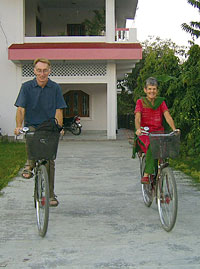|
|
In Morang each day, locals are treated to the unusual sight of a middle-aged British couple pedalling their bicycles to or from the District Education Office, the Teacher Training Centre and various schools around the district.
David Spinney, 61, and Deborah Jordan, 59, have been following this routine for the past seven months in their work as teacher trainers. David, former principal of a school in London, is now helping improve the quality of teaching at three schools in Biratnagar. Deborah, his wife, has been a teacher for 33 years and is running a 10-month training course for teachers from Morang, Sunsari and Sankhuwasabha.
The couple came to Nepal with the British development charity VSO after a three-year teaching stint in Ethiopia. It is David's first time in Nepal, although Deborah once came to Pokhara on a school trip with her students. At that time, she admits, she had little interest in Nepal's educational system. But now, with a job to do, she has made sure she knows all about it.
Compared with Ethiopia, Nepal's education system is in good shape, she says. In Britain, more than 90 percent of students go to government-funded schools and the educational standard is generally high. "Here it is the exact opposite: only the poor send their children to public schools," says David. "Even middle-class people hesitate to send their children to government schools."
Deborah believes the poor student-to-teacher ratios and small classrooms often make teaching ineffective in Nepal's public schools. David, after seeing 135 students packed into a single classroom at the Janapath Higher Secondary School in Biratnagar, says: "When you ask a question, 55 of them answer simultaneously."
But he feels the training he and Deborah provide can have a positive effect. They teach their students to speak in turn, and they show them how to make learning more fun - both for the teachers and the students.
Deborah says many teachers here are dissatisfied with their jobs. Low pay and society's negative perception of teachers are part of the problem. She believes the government should make education a priority and give teachers more respect.
"I could have been a doctor or an engineer, but I chose to be a teacher," David says. "I've seen that many are dissatisfied with teaching here but I don't believe that I would have found satisfaction in any other profession."
He remembers how proud his parents were when he was appointed principal of a London school. "Nepali society doesn't respect the teaching profession," he says. "This is why there are very few people who wish to become teachers."



